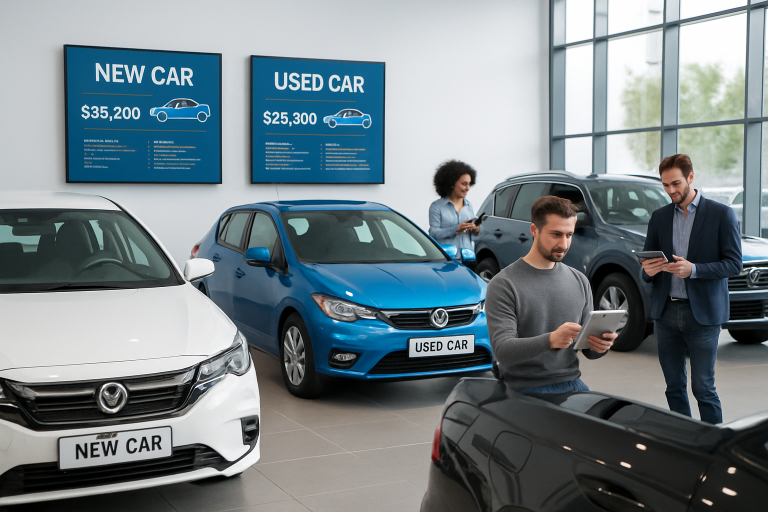Table of Contents
- 1 Introduction
- 2 Digital Research and Online Presence
- 3 Emphasis on Value and Affordability
- 4 Demand for Safety and Technology Features
- 5 Sustainability and Eco-Friendly Options
- 6 Personalized Customer Experience
- 7 Flexible Financing and Transparent Pricing
- 8 Return to In-Person Dealership Visits
- 9 Conclusion
Introduction
Modern car shoppers enter the dealership world with new expectations shaped by technology, economics, and changing social values. Today’s buyers are more empowered, informed, and connected, demanding seamless experiences, practical value, and complete transparency throughout their automotive journey. For dealerships, understanding and adapting to these evolving trends is the key to building trust, creating lasting relationships, and driving success in a dynamic marketplace.
A strong online presence is essential for dealership success in today’s automotive market. Customers increasingly rely on digital platforms to research new models or explore certified pre-owned options, expecting seamless access to information and user-friendly tools. Like many industry leaders, a Toyota dealer meets this demand by offering detailed vehicle specs, real-time inventory, and responsive online support. This approach bridges the gap between online exploration and in-person visits, aligning with how modern buyers prefer to shop.
Digital Research and Online Presence
The vehicle purchasing journey usually begins online, with buyers visiting multiple websites, comparing features, prices, and reviews before setting foot on the lot. According to a Progressive research report, 75% of recent car buyers completed their transaction in person, but most of their initial decision-making occurred digitally. Dealerships that invest in virtual tours, interactive comparison tools, and verified customer testimonials can establish credibility and stand out in a crowded digital landscape.
A user-friendly website experience with educational content, transparent pricing, and easy appointment scheduling helps potential customers feel more confident and in control of the buying process. Integrating social media channels and video walkarounds can also give shoppers a genuine sense of the dealership’s inventory and culture before visiting in person.
Emphasis on Value and Affordability
Evolving economic conditions have renewed consumers’ focus on getting the most for their money. Many buyers are open to certified used vehicles or lease returns, balancing quality and affordability. The average cost for a three-year-old used car has risen to $30,522 in 2025—a modest 2.3% increase from the prior year, still providing noticeable savings compared to equivalent new models. As highlighted in an Associated Press report, savvy buyers today frequently weigh long-term reliability, total ownership cost, and future resale value before making their final decision.
Dealerships that provide a diverse mix of new, used, and certified pre-owned vehicles and are transparent about vehicle history and pricing breakdowns empower buyers and foster loyalty in a competitive market.

Demand for Safety and Technology Features
Modern shoppers expect the latest innovations in automotive safety and connectivity. Features like adaptive cruise control, blind-spot monitoring, and real-time navigation are becoming non-negotiable in their search criteria. Interactive infotainment systems, integration with personal devices, and the availability of comprehensive driver assistance packages are key differentiators. According to Kelley Blue Book, highlighting these modern technology and safety features can significantly influence purchase decisions, especially among younger or tech-savvy buyers.
Sustainability and Eco-Friendly Options
Environmental consciousness is steadily reshaping automotive trends, with electric and hybrid models in ever-increasing demand. Dealerships that offer a wide selection of eco-friendly vehicles are best positioned to capture the interest of green-minded consumers. The availability of used electric cars—many coming off lease—makes this segment even more accessible and attractive to budget-conscious buyers. As Axios reports, the next wave of electric vehicle adoption will be driven by affordability, expanding infrastructure, and expanded second-hand EV inventory.
Personalized Customer Experience
One-size-fits-all is fading into obsolescence, replaced by the power of personalization. Data analytics and AI-driven tools allow dealerships to refine their approach, offering customized recommendations, communications, and financing options tailored to individual needs and priorities. Superior experiences—whether through dedicated sales advisors, online chat support, or follow-up service reminders—make customers feel valued and understood, increasing satisfaction and encouraging repeat business.
Flexible Financing and Transparent Pricing
Buyers expect open, upfront discussions of pricing and financing. Hidden fees or complex terms can quickly erode trust and cause potential customers to disappear. Transparent, menu-based pricing—backed by multiple financing options and payment calculators—lets buyers confidently evaluate their options and choose a package that fits their budget. This clarity is a significant selling point in an era where trust and transparency influence almost every purchasing decision. According to Kelley Blue Book, dealerships prioritizing straightforward pricing and streamlined transactions are seeing higher customer satisfaction and increased sales conversions.
Return to In-Person Dealership Visits
While the digital journey is essential, the in-person dealership visit remains a pivotal part of buying a vehicle. Many buyers still want to physically test-drive vehicles and consult with knowledgeable staff before making their final selection. With 75% of buyers completing their purchase on-site, dealerships must ensure the seamless transition from online inquiry to in-person meeting. Friendly, informed staff and a welcoming, pressure-free environment make dealerships memorable and trustworthy—a central element in the final buying decision. Further insights on these preferences can be found in the latest Progressive Insights report.
Conclusion
Dealerships that understand and adapt to the evolving needs of today’s car buyers will stand above the competition. By enhancing digital engagement, offering affordability and value, prioritizing advanced features, promoting eco-friendly options, delivering highly personalized experiences, providing transparent financial solutions, and excelling online and onsite, they can forge strong relationships and ensure long-term success. Modern car buying is about empowerment, transparency, and trust—qualities that the best dealerships strive to deliver daily.
